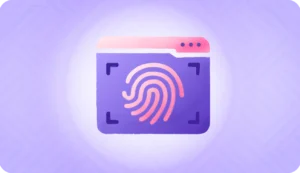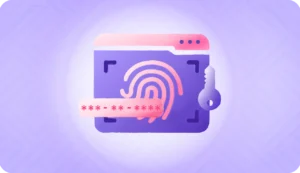According to McKinsey, countries that adopt digital ID could generate value equal to 3 to 13% of GDP by 2030. KBA meaning Knowledge-Based Authentication is a technique for verifying an individual’s identification that is based on knowledge of their data. KBA proposes that persons be required to respond to a pre-shared or computer-generated personal inquiry as evidence that they are who they claim they are.
KBA makes sure that a user accessing your platform is aware of certain details like a password (or a secret) and secret responses to less-than-secret questions.
Multiple drawbacks exist in this authentication mechanism. A secret question is essentially the same as a password, and since it is a word or sentence, it isn’t very secure. Since most users honestly answer these questions, it is simple for scammers to obtain the information and utilize it to their advantage (via searching, purchasing, leaking, or hacking). Thus, there are a few KBA alternatives that offer more security and reliability.
Types of Knowledge-based authentication
For identity verification, a huge proportion of website services, email providers, and financial institutions employ KBA. There are three primary kinds of KBA: static KBA, dynamic KBA, and enhanced KBA.
Static KBA
Regarding password recovery, static KBA is one of the most well-liked components of the MFA (multi-factor authentication) system. The user is required to enter specific data that was provided when the account was first opened to access the account. For example, the name of their first teacher or the name of their first school.
Dynamic KBA
With dynamic KBA, the user is uninformed of the question that will be posed as it is developed by the system autonomously without consulting the respondent first. The question-and-answer combinations are chosen using current public information and other data sources. Additionally, dynamic KBA questions have an expiry date, which prevents potential swindlers from having enough time to look for a solution.
Dynamic KBA is utilized in many financial organizations to assure compliance and avoid fraud due to its improved security, but mostly as a secondary authentication mechanism.
Enhanced KBA
Improved dynamic KBA combines the two methods mentioned above and creates unique security questions using user-proprietary data that is gathered and stored behind the enterprise firewall. This in some cases enables the development of a complete authentication solution online to authenticate both new and existing users.
Pros and cons of KBA
In order to confirm users’ identities for account opening, login, or other online activity, KBA requires them to respond to particular security questions. Unfortunately, KBA’s promise is dampened by certain unfavorable realities.
Advantages
KBA employs four or five of the infamous “out of wallet” questions, which reduces the risk of identity theft. The following are the pros KBA brings to the table:
- All public documents are used to generate questions through various databases, and they are not credit-based. This is crucial since using credit data for identity reasons could be illegal in some jurisdictions.
- Questions are developed with the help of data accumulated over 30 years.
- This procedure makes it more challenging for a user’s spouse to sign on their partner’s behalf.
- The time constraint on the questions means that there is a lower possibility of a fraudster looking up answers.
Drawbacks
KBA has a few shortcomings of its own. Some people could have difficulty remembering the answers since the questions are derived from a diverse range of public records and information sources.
- The abundance of personal information that is available online is KBA’s biggest flaw.
- The memory quality of the answers, particularly if they speak to enduring personal preferences.
- Unlike KBA alternatives, nothing in KBA prevents internal disclosure of the answers to the secret questions.
KBA Alternatives
Solutions for strong identity verification are ideal for safely registering users for financial services. Identity verification is a required precaution as well as a compliance obligation for an increasing number of industries. The following are a few KBA alternatives that perform better:
- Two-Factor Authentication (2FA)
Multiple identity verification techniques are needed for two-factor authentication. It combines any two of the following: knowledge, possessions, or identity. A username and password are combined with a one-of-a-kind verification code that is texted or emailed to the user as part of 2FA.
- Credit Bureau-Based Solutions
Experian, Equifax, and TransUnion are the three major credit bureaus that receive calls from several online identity verification systems. These bureaus then check their vast databases of consumer credit data for matches to identities.
- Database Solutions
Database solutions frequently use online, social media, and offline data (and occasionally behavioral patterns) when used for identity verification to determine whether an online user is legitimate, a scammer, or a bot.
- Online Identity Verification Solutions
Online identity verification tools evaluate the authenticity and ownership of a government-issued ID using a combination of artificial intelligence, computer vision, and verification specialists. Some solutions additionally conduct identity validity checks using a corroborated selfie. This is to make sure the person carrying the ID is the same in the ID photo. They even conduct liveness checks to confirm the person holding the ID is physically there throughout the transaction.
The aforementioned factors all help to guarantee simpler and more reliable authentication, compliance with KYC regulations, and a better user experience. Additionally, these KBA alternatives are substantially cheaper and easier to install.
Finale
Identity verification has advanced to the point where security can co-exist with convenience. Secure identity verification can be used to rapidly and precisely verify a user. The use of biometric identity verification eliminates the need for lengthy, hackable passwords using biometrics (such as your facial features and ID verification).
It could be time to start looking into identity verification alternatives if your expanding firm can’t abide by KBA’s limitations. Your search ends with Hyperverge, an alternative to knowledge-based authentication. To learn how to securely streamline identity verification with your products and services, you can schedule a free demo.
FAQs
Why is knowledge-based authentication used?
KBA is an authentication technique that verifies a person’s identification through a series of knowledge questions to prevent unauthorized access to a location or an account.
How effective is knowledge-based authentication?
The degree of security that the authentication offers is directly connected to the reliability of the source of the data while establishing KBA.
How are KBA questions produced?
KBA creates questions based on data from a person’s credit history, public records, or personal background.
How does knowledge-based authentication operate?
An authentication method known as knowledge-based authentication (KBA) obligates the user to respond to at least one “secret” question.





